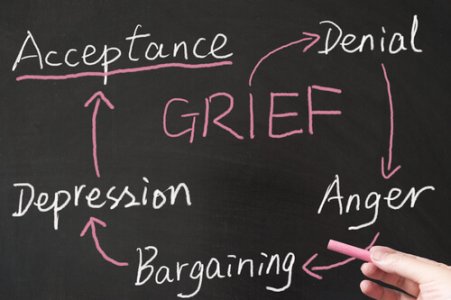Ask Joy: How We Respond To Others Experiencing Grief
- Replies 3
Note from the Editor:
This article was kindly written for the SDC by retired psychologist/ member @Joy Straw.
In an earlier article, we looked at grief, its impact, and the ‘grief cycle’. In this article, we look at how your feelings relate to grief and how we can respond to others in grief.
A member recently suggested they had ‘zero empathy’, and this can make it difficult to understand an appropriate response for others, but if we understand that how we respond is not about what we would want but what someone else may need, it will become easier to respond appropriately.
THE GRIEF CYCLE
There are many factors that influence our response to grief. Empathy, or lack of empathy, can enhance or spoil a person’s experience. The distance from the grief also has an impact; whether it was a close loved one, a distant cousin or something read in the newspaper will factor in our depth of response. Our relationship also factors in our grief, i.e. the death of a parent or child can be especially painful but does not lessen someone else’s experience of their grief if it is a friend or an animal.
Our individual feelings are unique to ourselves and, therefore, require us to respond, not how we want, but how the other person may need us to respond. If this is our first experience of grief, it may be far more traumatic than if we have experienced it before. Our knowledge that we have survived our cycle of grief in the past can give us reassurance that we can survive our current grief.
Fear of death and/or grief can give rise to a myriad of feelings, not just associated with the grief cycle. These fears can lead to anxiety and depression that reach beyond our cycle of grief. If that is the case, medical intervention may be necessary. We can, however, help others and ourselves to move through the grief cycle. Be there, whether that is a phone call, shopping, a cup of coffee, or simply listening.
Lorem ipsum dolor sit amet, consectetur adipiscing elit. Quisque in diam id erat facilisis consectetur vitae vel urna.
Ut lacus libero, suscipit auctor ipsum sit amet, viverra pretium nisl. Nullam facilisis nec odio nec dapibus. Integer maximus risus et velit porttitor ullamcorper
This article was kindly written for the SDC by retired psychologist/ member @Joy Straw.
In an earlier article, we looked at grief, its impact, and the ‘grief cycle’. In this article, we look at how your feelings relate to grief and how we can respond to others in grief.
A member recently suggested they had ‘zero empathy’, and this can make it difficult to understand an appropriate response for others, but if we understand that how we respond is not about what we would want but what someone else may need, it will become easier to respond appropriately.
THE GRIEF CYCLE
There are many factors that influence our response to grief. Empathy, or lack of empathy, can enhance or spoil a person’s experience. The distance from the grief also has an impact; whether it was a close loved one, a distant cousin or something read in the newspaper will factor in our depth of response. Our relationship also factors in our grief, i.e. the death of a parent or child can be especially painful but does not lessen someone else’s experience of their grief if it is a friend or an animal.
Our individual feelings are unique to ourselves and, therefore, require us to respond, not how we want, but how the other person may need us to respond. If this is our first experience of grief, it may be far more traumatic than if we have experienced it before. Our knowledge that we have survived our cycle of grief in the past can give us reassurance that we can survive our current grief.
Fear of death and/or grief can give rise to a myriad of feelings, not just associated with the grief cycle. These fears can lead to anxiety and depression that reach beyond our cycle of grief. If that is the case, medical intervention may be necessary. We can, however, help others and ourselves to move through the grief cycle. Be there, whether that is a phone call, shopping, a cup of coffee, or simply listening.
Lorem ipsum dolor sit amet, consectetur adipiscing elit. Quisque in diam id erat facilisis consectetur vitae vel urna.
Ut lacus libero, suscipit auctor ipsum sit amet, viverra pretium nisl. Nullam facilisis nec odio nec dapibus. Integer maximus risus et velit porttitor ullamcorper
Read more for FREE!
Become a member today and join over 200,000 Australians already taking advantage of daily news, weather, petrol costs, games, jokes, deals and more.
-
FREE 400-page Discount eBook upon joining
-
FREE Aussie-made eBook & many more
-
Multiple daily discounts for members
-
No payment required
Register Faster Using
Or Register with email
Already a member?
Last edited by a moderator:








